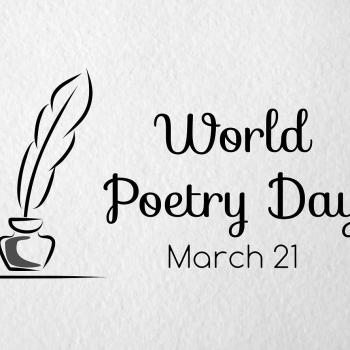Today is World Poetry Day.

Event Description
Believed to have its origin in the 1930s, World Poetry Day is now celebrated in hundreds of countries around the world. This day provides a perfect opportunity to examine poets and their craft in the classroom. In 1999, UNESCO (the United Nations Educational, Scientific, and Cultural Organization) also designated March 21 as World Poetry Day.
Classroom Activity
"Introduction to Poetry" by Billy Collins provides a wonderful place to begin a discussion on how readers approach a poem. Ask students to skim quickly through the poem and write their initial responses in their journals or on paper. What words and images stand out for them? What is their emotional reaction to the poem (e.g., surprise, dismay, anger)? Ask students to share their responses with the class. Then have students read the poem a second time, this time more slowly and carefully, taking note of any figurative language (e.g., simile, metaphor, hyperbole) they encounter. What do they think Collins is saying about the study of poetry? According to Collins, what is the real goal of reading poetry?
Ask students to think about a favorite poem and imagine the perfect way to read it. Where would they be when they read it? Would they read it fast or slow? Out loud or to themselves? Have them compose their own poem about reading poetry. Students can use tools provided by ReadWriteThink to create Acrostic Poems, Diamante Poems, Letter Poems, or Theme Poems.
Websites
This website includes the work of hundreds of poets and more than 1400 poems. Included are poet biographies, selected works, and a collection of poems in audio format.
From the Library of Congress, this site features a year's worth of poetry for high school students. Beginning with Billy Collins' "Introduction to Poetry," the poems are meant to be read aloud, and enjoyed by the entire school community.
Though not all poems are appropriate for younger readers, you can search the archives to find a full year of poems.